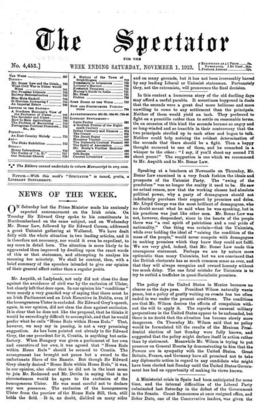Mr. Asquith, at Ladybank, not only did not close the
door against the avoidance of civil war by the exclusion of Ulster, but clearly left that door open. In our opinion his " conditions " were merely a very guarded way of saying that there must be an Irish Parliament and an Irish Executive in Dublin, even if the homogeneous Ulster is excluded. Sir Edward Grey's speech, again, in our opinion, did not slam the door against exclusion. It is clear that he does not like the proposal, that he thinks it would be exceedingly difficult to accomplish, and that he would prefer what he calls "Home Rule within Home Rule." That, however, we may say in passing, is not a very promising suggestion. As has been pointed out already to Sir Edward Grey, the one precedent for it, Croatia, is anything but satis- factory. When Hungary was given a parliament of her own and executive of her own, it was agreed that "Home Rule within Home Rule" should be secured to Croatia. The arrangement has brought not peace but a sword to the unfortunate Slays of the Banate. But though Sir Edward Grey clearly desired "Home Rule within Home Rule," it was, in our opinion, also clear that he did not in the least mean to join Mr. Redmond and Mr. Devlin in saying that in no circumstances would he agree to the exclusion of the homogeneous Ulster. He was most careful not to declare any non possumus. The exclusion of the homogeneous Ulster from the purview of the Home Rule Bill, then, still holds the field. It is, no doubt, disliked on many sides
and on many grounds, but it has not been irrevocably barred by any leading Liberal or Unionist statesman. Fortunately they, not the extremists, will pronounce the final decision.






























































 Previous page
Previous page